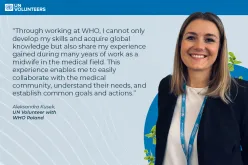UN Volunteers support the efforts of the World Health Organization (WHO) to ensure that health can be accessed by everyone equally. This year, World Health Day was observed with the theme - 'My Health, my right' - adding emphasis to health as a basic human right and as such amplifying its urgency.
In Poland, WHO faced a major challenge with the influx of Ukrainians fleeing war in their home country. Health aid was needed swiftly and in response, WHO recruited 13 UN Volunteers for two years (2022-23) in Poland. These volunteers integrated into the United Nations' response efforts and contributed to providing health services to refugees.
To fulfill WHO's mandate in this setting, Aleksandra Kusek served as UN Volunteer Women and Girls Health Emergency Officer and implemented a project to counter gender-based violence in collaboration with the Ministry of Health and other stakeholders in Poland.
A midwife, Aleksandra worked with pregnant women giving birth in delivery rooms. She also led a team of nursing staff. "This experience enabled me to easily collaborate with the medical community, understand their needs, and establish common goals and actions,” she shares.
Recent data from the United Nations Refugee Agency (UNHCR) shows that after the escalation of the war in Ukraine, more than 1.5 million refugees were registered and more than 900,000 of them are under temporary protection in Poland - making it the country with highest number of refugees from Ukraine.
Along with maternal health, mental and psychological health was also addressed through volunteering. Katarzyna Dolowy served as an Online Volunteer with WHO. She has a background in international affairs and experience in digital media and marketing, which helped Katarzyna synthesize information from existing articles, conduct interviews with trainers to provide comprehensive insights on mental health and the stigma attached to it, and draft content on mental health.
It was memorable to connect with individuals who were not just beneficiaries, but genuinely cared about and were impacted by the global initiatives of WHO. Meeting these individuals provided a tangible and human perspective to the organization's work, making the impact more meaningful.” Katarzyna Dolowy, Online Volunteer with WHO in Poland.
According to a survey conducted by WHO Poland, one in 10 Ukrainian refugees reported mental health needs. Recent figures show that 60 per cent of patients requiring mental health support did not seek help due to the stigma around it.
In Europe and the Commonwealth of Independent States (ECIS) in 2023, some 19 per cent of UN Volunteers supported projects on good health and well-being, and up to 400 Online Volunteers were requested by UN agencies for health-related assignments.
The volunteering assignments of Aleksandra and Katarzyna underpinned two important aspects of health - maternal and mental.
This year, the Health Day theme, 'My health, my right' speaks volumes - and the urgency of it, particularly for the ones being left behind.

